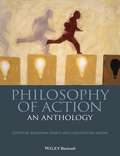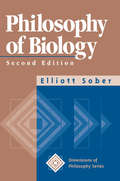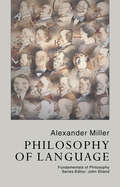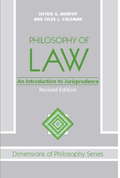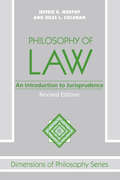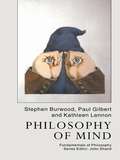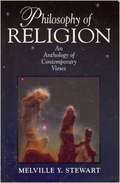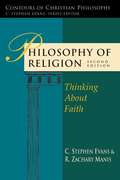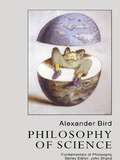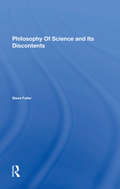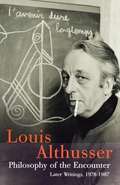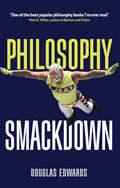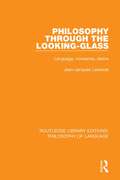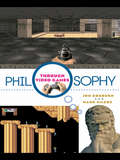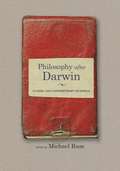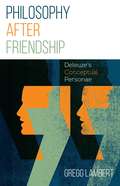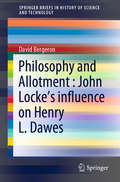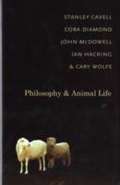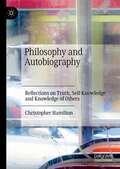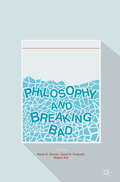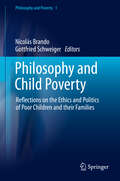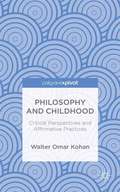- Table View
- List View
Philosophy Of Action: An Anthology
by Constantine Sandis Jonathan DancyThe Philosophy of Action: An Anthology is an authoritative collection of key work by top scholars, arranged thematically and accompanied by expert introductions written by the editors. This unique collection brings together a selection of the most influential essays from the 1960s to the present day. An invaluable collection that brings together a selection of the most important classic and contemporary articles in philosophy of action, from the 1960's to the present day. No other broad-ranging and detailed coverage of this kind currently exists in the field. Each themed section opens with a synoptic introduction and includes a comprehensive further reading list to guide students. Includes sections on action and agency, willing and trying, intention and intentional action, acting for a reason, the explanation of action, and free agency and responsibility. Written and organised in a style that allows it to be used as a primary teaching resource in its own right.
Philosophy Of Biology: Essays In Evolutionary Philosophy (Dimensions Of Philosophy Ser.)
by Elliott SoberPerhaps because of it implications for our understanding of human nature, recent philosophy of biology has seen what might be the most dramatic work in the philosophies of the ?special? sciences. This drama has centered on evolutionary theory, and in the second edition of this textbook, Elliott Sober introduces the reader to the most important issues of these developments. With a rare combination of technical sophistication and clarity of expression, Sober engages both the higher level of theory and the direct implications for such controversial issues as creationism, teleology, nature versus nurture, and sociobiology. Above all, the reader will gain from this book a firm grasp of the structure of evolutionary theory, the evidence for it, and the scope of its explanatory significance.
Philosophy Of Judaism
by Joshua AdlerA survey of the sociological and cultural aspects of Judaism in society today.
Philosophy Of Language (Fundamentals of Philosophy)
by Alex MillerThis engaging and accessible introduction to the philosophy of language provides an important guide to one of the liveliest and most challenging areas of study in philosophy. Interweaving the historical development of the subject with a thematic overview of the different approaches to meaning, the book provides students with the tools necessary to understand contemporary analytical philosophy.
Philosophy Of Law
by Jeffrie G. Murphy Jules ColemanThis leading anthology contains legal cases and essays written by the finest scholars in legal philosophy, representing all major points of view on the most central topics in philosophy of law. Its primary focus is to relate traditional themes of legal philosophy to the concerns of modern society in a way that invigorates one and illuminates the other, respectively. This classic text is distinguished by its clarity, balance of topics, balance of substantive positions on controversial questions, topical relevance, imaginative use of cases and stories, and the inclusion of only lightly edited or untouched classics. This revision is distinguished in its inclusion of many articles relevant to terrorism and torture, contract and property, and a greater emphasis on concrete legal problems.
Philosophy Of Law
by Jeffrie G. Murphy Jules ColemanIn this revised edition, two distinguished philosophers have extended and strengthened the most authoritative text available on the philosophy of law and jurisprudence. While retaining their comprehensive coverage of classical and modern theory, Murphy and Coleman have added new discussions of the Critical Legal Studies movement and feminist jurisprudence, and they have strengthened their treatment of natural law theory, criminalization, and the law of torts. The chapter on law and economics remains the best short introduction to that difficult, controversial, and influential topic.Students will appreciate the careful organization and clear presentation of complicated issues as well as the emphasis on the relevance of both law and legal theory to contemporary society.
Philosophy Of Law
by Jeffrie G. Murphy Jules ColemanIn this revised edition, two distinguished philosophers have extended and strengthened the most authoritative text available on the philosophy of law and jurisprudence. While retaining their comprehensive coverage of classical and modern theory, Murphy and Coleman have added new discussions of the Critical Legal Studies movement and feminist jurisprudence, and they have strengthened their treatment of natural law theory, criminalization, and the law of torts. The chapter on law and economics remains the best short introduction to that difficult, controversial, and influential topic.Students will appreciate the careful organization and clear presentation of complicated issues as well as the emphasis on the relevance of both law and legal theory to contemporary society.
Philosophy Of Law: An Introduction To Jurisprudence (Texts In Philosophy Ser. #3)
by Jeffrie G. MurphyIn this revised edition, two distinguished philosophers have extended and strengthened the most authoritative text available on the philosophy of law and jurisprudence. While retaining their comprehensive coverage of classical and modern theory, Murphy and Coleman have added new discussions of the Critical Legal Studies movement and feminist jurisprudence, and they have strengthened their treatment of natural law theory, criminalization, and the law of torts. The chapter on law and economics remains the best short introduction to that difficult, controversial, and influential topic.Students will appreciate the careful organization and clear presentation of complicated issues as well as the emphasis on the relevance of both law and legal theory to contemporary society.
Philosophy Of Mind: Continental Themes In Philosophy Of Mind And Body (Fundamentals of Philosophy #2)
by Paul Gilbert Kathleen LennonA welcome introduction to one of the most intellectually demanding areas of the undergraduate philosophy curriculum. The authors provide a clear framework within which students can fit contemporary developments in the Anglo-American tradition which provide the core themes of philosophy of mind and which connect to their other work in epistemology and philosophy of language.
Philosophy Of Religion: An Anthology Of Contemporary Views (Philosophy)
by Melville Y. StewartThis volume contains primarily recent essays in philosophy of religion, representing the analytic and continental traditions of the West. A total of 36 authors from varying Christian traditions, and several from the atheistic orientation have contributed to a total of 42 essays. Nearly half of the essays are unique to this anthology.
Philosophy Of Religion: Thinking About Faith
by C. Stephen Evans R. Zachary ManisWith over 40,000 copies in print since its original publication in 1982, Steve Evans's Philosophy of Religion has served many generations of students as a classic introduction to the philosophy of religion from a Christian perspective. Over the years the philosophical landscape has changed, and in this new edition Zach Manis joins Evans in a thorough revamping of arguments and information, while maintaining the qualities of clarity and brevity that made the first edition so appreciated. New material on divine foreknowledge and human freedom has been added as well as on Reformed epistemology. The discussions on science now cover new developments from cognitive psychology and naturalism as well as on the fine-tuning of the cosmos. The chapter on faith and reason has been expanded to include consideration of evidentialism. The problem of evil now forms its own new chapter and adds a discussion of the problem of hell. The standard features remain: a survey of the field, an examination of classical arguments for God's existence, and an exploration of contemporary challenges to theism from the social sciences and philosophy as well as the natural sciences. The meaning and significance of personal religious experience, revelation and miracles--all within the realm of contemporary religious pluralism--are likewise investigated. A classic introduction thoroughly updated and refreshed for today's student.
Philosophy Of Science (Fundamentals of Philosophy #5)
by Alexander BirdAn up-to-date, clear but rigorous introduction to the philosophy of science offering an indispensable grounding in the philosophical understanding of science and its problems. The book pays full heed to the neglected but vital conceptual issues such as the nature of scientific laws, while balancing and linking this with a full coverage of epistemological problems such as our knowledge of such laws.
Philosophy Of Science And Its Discontents
by Steve FullerThe most important and exciting recent development in the philosophy of science is its merging with the sociology of scientific knowledge. Here is the first text book to make this development available.
Philosophy Of The Encounter: Later Writings, 1978-1987
by Louis Althusser G. M. Goshgarian Francois Matheron Oliver CorpetIn the late 1970s and 1980s, Louis Althusser endured a period of intense mental instability during which he murdered his wife and was committed to a psychiatric hospital. Spanning this deeply troubling period, this fourth and final volume of political and philosophical writings reveals Althusser wrestling in a creative and unorthodox fashion with a whole series of theoretical problems to produce some of his very finest work. In his profound exploration of questions of determinism and contingency, Althusser developed a "philosophy of the encounter," which he links to a hidden and subterranean tradition in the history of Western thought which stretches from Epicurus through Spinoza and Machiavelli to Marx, Derrida and Heidegger.
Philosophy Smackdown
by Douglas EdwardsFrom its carnival origins to its current status as a global phenomenon, pro wrestling has a unique presence in popular culture. Part sport and part theatre, the impressive antics of its larger-than-life characters have captured the imaginations of generations of fans, and prompted endless speculation about behind-the-scenes machinations.Philosophy Smackdown is a study of pro wrestling as distinctive as pro wrestling itself: it is the first philosophical look at this major cultural spectacle. Philosopher and fan Douglas Edwards takes both philosophy and pro wrestling to parts unknown. With liveliness, humor and insight, he shows that pro wrestling is fertile ground for reflection on fundamental human issues, such as reality, freedom, identity, morality, justice, and meaning. He explores these through pivotal events in pro wrestling, from the eighties heyday of Hulkamania to the recent emergence of AEW.Philosophy Smackdown is a read that will delight philosophers and pro wrestling fans alike. It's time to ask yourself: Whatcha gonna do when Philosophy Smackdown runs wild on you?
Philosophy Through The Looking-Glass: Language, Nonsense, Desire
by Jean-Jacques LecercleIt is generally accepted that language is primarily a means of communication. But do we always mean what we say – must we mean something when we talk? This book explores the other side of language, where words are incoherent and meaning fails us. it argues that this shadey side of language is more important in our everyday speech than linguists and philosophers recognize. Historically this other side of language known as has attracted more attention in France than elsewhere. It is particularly interesting because it brings together texts from a wide range of fields, including fiction, poetry and linguistics. The author also discusses the kind of linguistics that must be developed to deal with such texts, a linguistics which makes use of psychoanalytic knowledge. This tradition of writing has produced a major philosopher, Gilles Deleuze. This book provides an introduction to his work, an account of his original theory of meaning and an analysis of the celebrated Anti-Oedipus, which takes délire as one of its main themes.
Philosophy Through Video Games
by Jon Cogburn Mark SilcoxHow can Wii Sports teach us about metaphysics?Can playing World of Warcraft lead to greater self-consciousness?How can we learn about aesthetics, ethics and divine attributes fromZork, Grand Theft Auto, and Civilization?A variety of increasingly sophisticated video games are rapidly overtaking books, films, and television as America's most popular form of media entertainment. It is estimated that by 2011 over 30 percent of US households will own a Wii console - about the same percentage that owned a television in 1953. In Philosophy Through Video Games, Jon Cogburn and Mark Silcox - philosophers with game industry experience - investigate the aesthetic appeal of video games, their effect on our morals, the insights they give us into our understanding of perceptual knowledge, personal identity, artificial intelligence, and the very meaning of life itself, arguing that video games are popular precisely because they engage with longstanding philosophical problems.Topics covered include:* The Problem of the External World* Dualism and Personal Identity* Artificial and Human Intelligence in the Philosophy of Mind* The Idea of Interactive Art* The Moral Effects of Video Games* Games and God's GoodnessGames discussed include:Madden Football, Wii Sports, Guitar Hero, World of Warcraft, Sims Online, Second Life, Baldur's Gate, Knights of the Old Republic, Elder Scrolls, Zork, EverQuest Doom, Halo 2, Grand Theft Auto, Civilization, Mortal Kombat, Rome: Total War, Black and White, Aidyn Chronicles
Philosophy after Darwin: Classic and Contemporary Readings
by Michael RuseWittgenstein famously remarked in 1923, "Darwin's theory has no more relevance for philosophy than any other hypothesis in natural science." Yet today we are witnessing a major revival of interest in applying evolutionary approaches to philosophical problems. Philosophy after Darwin is an anthology of essential writings covering the most influential ideas about the philosophical implications of Darwinism, from the publication of On the Origin of Species to today's cutting-edge research.Michael Ruse presents writings by leading modern thinkers and researchers--including some writings never before published--together with the most important historical documents on Darwinism and philosophy, starting with Darwin himself. Included here are Herbert Spencer, Friedrich Nietzsche, Thomas Henry Huxley, G. E. Moore, John Dewey, Konrad Lorenz, Stephen Toulmin, Karl Popper, Edward O. Wilson, Hilary Putnam, Philip Kitcher, Elliott Sober, and Peter Singer. Readers will encounter some of the staunchest critics of the evolutionary approach, such as Alvin Plantinga, as well as revealing excerpts from works like Jack London's The Call of the Wild. Ruse's comprehensive general introduction and insightful section introductions put these writings in context and explain how they relate to such fields as epistemology, philosophy of mind, philosophy of language, and ethics.An invaluable anthology and sourcebook, Philosophy after Darwin traces philosophy's complicated relationship with Darwin's dangerous idea, and shows how this relationship reflects a broad movement toward a secular, more naturalistic understanding of the human experience.
Philosophy after Friendship: Deleuze’s Conceptual Personae
by Gregg LambertThe friend, the enemy, the stranger, the refugee or deportee, and the survivor. In singular and provocative fashion, Gregg Lambert&’s Philosophy after Friendship introduces us to the key social personae that have populated modern political philosophy. Drawing on the philosophies of Deleuze and Derrida, as well as the work of Indo-European linguist Émile Benveniste, Lambert constructs a genealogy to demonstrate how political thought has been structured by the emergence of such &“conceptual personae.&” At the center of Philosophy after Friendship is the persona of the friend, together with the idea of friendship, on which the democratic ideals of consensus, fraternity, and equality are based. Lambert argues that the vitality of this conceptual persona, originated by the Greeks, has been exhausted by centuries of war. In fact, we might today be witnessing the overturning of an earlier philosophical idealism that saw friendship as the destination of the political and, in its place, the emergence of a nonphilosophical understanding that has set perpetual war as the ultimate ground from which future thinking of the political must depart. In his Conclusion, Lambert proposes a truly &“postwar philosophy&” that takes as its first principle the idea of perpetual peace, which would require nothing less than a complete reevaluation of the goals of any future political philosophy, if not the meaning of philosophy itself.
Philosophy and Allotment : John Locke's influence on Henry L. Dawes (SpringerBriefs in History of Science and Technology)
by David BergeronThis book provides a new perspective for examining the Native policies of the late nineteenth century. It centers on the figure of Henry Laurens Dawes, and more specifically, on the conceptual roots of his views on allotment, education and assimilation. These roots are grounded in John Locke’s epistemology and pedagogy. Through a philosophical analysis of Dawes’ ideas and policies, the book provides a new approach to arrive at a better understanding of an important historical process. In this regard, an often-overlooked link between philosophy and history is clarified, helping philosophers, historians and other scholars in their quest for knowledge. This book clarifies the impact of philosophical ideas on historical conceptions, and by studying Dawes, also addresses the reflection behind a major historical process. Political and social philosophers, as well as historians of ideas and of Native policies, will greatly benefit from this concise book.
Philosophy and Animal Life
by Stanley Cavell Ian Hacking John Mcdowell Cora Diamond Cary WolfePhilosophy and Animal Life offers a new way of thinking about animal rights, our obligation to animals, and the nature of philosophy itself. Cora Diamond begins with "The Difficulty of Reality and the Difficulty of Philosophy," in which she accuses analytical philosophy of evading, or deflecting, the responsibility of human beings toward nonhuman animals. Diamond then explores the animal question as it is bound up with the more general problem of philosophical skepticism. Focusing specifically on J. M. Coetzee's The Lives of Animals, she considers the failure of language to capture the vulnerability of humans and animals. <p><p> Stanley Cavell responds to Diamond's argument with his own close reading of Coetzee's work, connecting the human-animal relation to further themes of morality and philosophy. John McDowell follows with a critique of both Diamond and Cavell, and Ian Hacking explains why Cora Diamond's essay is so deeply perturbing and, paradoxically for a philosopher, he favors poetry over philosophy as a way of overcoming some of her difficulties. Cary Wolfe's introduction situates these arguments within the broader context of contemporary continental philosophy and theory, particularly Jacques Derrida's work on deconstruction and the question of the animal. Philosophy and Animal Life is a crucial collection for those interested in animal rights, ethics, and the development of philosophical inquiry. It also offers a unique exploration of the role of ethics in Coetzee's fiction.
Philosophy and Autobiography: Reflections on Truth, Self-Knowledge and Knowledge of Others
by Christopher HamiltonThis book, taking its point of departure from Stanley Cavell’s claim that philosophy and autobiography are dimensions of each other, aims to explore some of the relations between these forms of reflection, first by seeking to develop an outline of a philosophy of autobiography, and then by exploring the issue from the side of five autobiographical works. Christopher Hamilton argues in the volume that there are good reasons for thinking that philosophical texts can be considered autobiographical, and then turns to discuss the autobiographies of Walter Benjamin, Peter Weiss, Jean-Paul Sartre, George Orwell, Edmund Gosse and Albert Camus. In discussing these works, Hamilton explores how they put into question certain received understandings of what philosophical texts suppose themselves to be doing, and also how they themselves constitute philosophical explorations of certain key issues, e.g. the self, death, religious and ethical consciousness, sensuality, the body. Throughout, there is an exploration of the ways in which autobiographies help us in thinking about self-knowledge and knowledge of others. A final chapter raises some issues concerning the fact that the five autobiographies discussed here are all texts dealing with childhood.
Philosophy and Breaking Bad
by Robert Arp Kevin S. Decker David R. KoepsellThis volume considers the numerous philosophical ideas and arguments found in and inspired by the critically acclaimed series Breaking Bad. This show garnered both critical and popular attention for its portrayal of a cancer-stricken, middle-aged, middle-class, high school chemistry teacher's drift into the dark world of selling methamphetamine to support his family. Its characters, situations, and aesthetic raise serious and familiar philosophical issues, especially related to ethics and morality. The show provokes a bevy of rich questions and discussion points, such as: What are the ethical issues surrounding drugs? What lessons about existentialism and fatalism does the show present? How does the show grapple with the concept of the end 'justifying' the means? Is Walt really free not to 'break bad'? Can he be redeemed? What is the definition and nature of badness (or evil) itself? Contributors address these and other questions as they dissect the legacy of the show and discuss its contributions to philosophical conversations.
Philosophy and Child Poverty: Reflections on the Ethics and Politics of Poor Children and their Families (Philosophy and Poverty #1)
by Gottfried Schweiger Nicolás BrandoThis book offers a broad and diverse reflection of the ways in which child poverty could be conceptualised, and the ways in which it is intertwined with childhood as a specific social condition. Furthermore, the responsibilities towards children and the possible mechanisms required for dealing with this condition will be analysed and clarified. This is the first volume on philosophy and child poverty. Despite the increasing number of publications on poverty, the particular phenomenon of poverty during childhood has not received much philosophical attention. This is surprising, given the severity and depth of child poverty around the globe. This volume brings together various philosophical approaches and how they understand and tackle child poverty. This is an important addition to the philosophical literature, which is also of wider interest to scholars working in the social sciences and with an interest in child poverty.
Philosophy and Childhood: Critical Perspectives and Affirmative Practices
by Walter Omar KohanKohan offers a transformative, revolutionary, and more radical alternative theory and practice of philosophy for children. He critiques the current state of philosophy for children and demonstrates alternative ways of thinking and practicing philosophy in childhood education.
